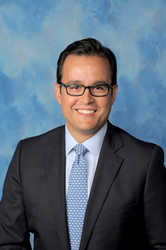
Demetrio Castillo, MD, is a cardiac electrophysiologist at Memorial Cardiac and Vascular Institute, part of the Hollywood, FL-based Memorial Healthcare System.
“The good news is that if you treat sleep apnea, atrial fibrillation (AFib) will sometimes go away. That’s why we encourage people to address sleep apnea as part of the treatment plan for atrial fibrillation.”- Dr. Demetrio Castillo
HOLLYWOOD, Fla. (PRWEB)
March 13, 2023
Although two-for-one deals are great when it comes to things you want, it’s not so fantastic when it comes to health conditions. But if you have an irregular heartbeat, you may have sleep apnea too. The condition causes you to stop breathing for brief periods while sleeping. Researchers have found that sleep apnea and irregular heartbeats (arrhythmias) are closely linked.
“The good news is that if you treat sleep apnea, atrial fibrillation (AFib) will sometimes go away,” says Demetrio Castillo, MD, an electrophysiologist (EP) at Memorial Cardiac and Vascular Institute. “That’s why we encourage people to address sleep apnea as part of the treatment plan for atrial fibrillation.”
The most common heart arrhythmia that people with sleep apnea have is AFib. If you have AFib, there’s up to a 50 percent chance that you also have sleep apnea. The rub: Most people with sleep apnea aren’t aware of what they go through when they doze off.
Researchers don’t fully understand how sleep apnea causes arrhythmia. But theories suggest it’s due to a lack of oxygen while you sleep. On-and-off breathing increases physical stress, which triggers a cascade of chemical responses that leads to changes in the heart over time.
During normal sleep, your heart and breathing rates slow down. But when sleep apnea cuts off your breath, your blood vessels narrow and your heart rate and blood pressure increase. When you unsuccessfully attempt to inhale, it also changes the pressure within your chest. This happens whenever you have a sleep apnea episode, which could occur many times a night.
“Sleep apnea also makes you more likely to have high blood pressure and diabetes, which contributes to heart problems too,” says Daniel Benhayon Lanes, MD, an electrophysiologist at Memorial CVI. “People don’t realize how significant a problem sleep apnea is. It deprives the lungs of oxygen, puts the body into stress and increases inflammation.”
Anyone can get sleep apnea, but you’re more at risk if you’re male, older or obese. Of the risk factors, obesity is the most significant and the only one you can change. Obesity also increases your risk of heart disease and arrhythmia directly.
“If you can lose weight, you’ll lower your blood pressure and relieve the pressure you’re putting on your heart. And your arrhythmia will improve,” says Dr. Benhayon.
In addition to having AFib, other signs you may have sleep apnea include:
Difficulty concentrating
Excessive daytime sleepiness
Morning headaches and dry mouth
Snoring, choking or gasping sounds at night
To diagnose sleep apnea, your healthcare provider will refer you for a sleep study or polysomnography. You’ll sleep overnight at a special sleep clinic room that is comfortable and dark. Sensors attached to you while you sleep monitor:
Air flow in/out of lungs
Brain waves
Heart rate
Awakenings
Eye movement
Breathing
Movement
Oxygen levels
Your doctor will review the results of your sleep study, personal medical and family history, and questionnaires that assess your sleep quality and symptoms to determine a diagnosis and treatment plan.
Addressing sleep apnea improves existing arrhythmias and may prevent new ones. The most common treatment for sleep apnea is continuous positive airway pressure (CPAP). This involves wearing a mask that delivers air in a way that prevents your airways from closing. Your provider may also recommend that you make lifestyle changes, such as:
Avoid sleeping on your back
Lose weight
Stop smoking
In studies of patients who have both sleep apnea and atrial fibrillation, the recurrence rates of AFIB are much higher after a cardiac ablation in the patients not using CPAP. Untreated or under-treated sleep apnea is one of the most common reasons for recurrent atrial fibrillation after an ablation.
Learn more about heart and vascular services at Memorial Cardiac and Vascular Institute. To schedule an appointment with a cardiologist, electrophysiologist or vascular specialist at Memorial, call 855-400-6284.
In addition, learn how we diagnose and treat sleep apnea with our sleep study services and Certified Sleep Center.
Share article on social media or email:

